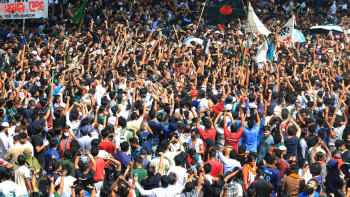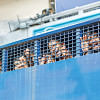July uprising: How do you measure the success of a year?

When you are a nation so wounded to the core, rebuilding is never easy. A year ago, when the authoritarian regime fell, one thing was clear: a long, painful, uncertain road was ahead of us. We knew that all kinds of players, many of them with questionable intentions, would be shooting their shots. We knew that servants of the old regime would change colours and try to blend in, and this includes some editors, who dedicated years to singing the most exalted praises of the dictator, suddenly trying to rebrand themselves as the voice of democracy. We knew that many would be subtly trying to undermine the efforts of the new caretaker government by creating as much chaos and confusion as possible, no longer bold enough to yell their "Jitbe abar nouka" slogans without fear or embarrassment.
It was an overwhelming situation, a dizzying moment in history that called for celebration while staring down the daunting prospect of rebuilding the country after more than 15 years of ruthless plunder at the hands of a psychopath and her cronies. A year on, while detractors will ceaselessly claim the caretaker government to be a failure, a tremendous amount has been achieved, but the main anxieties have not gone away.
Because while a coalition of forces was needed to bring down the tyrant, not all of those elements had democracy and rule by consensus at heart, and it is becoming clearer and clearer that my enemy's enemy is not necessarily my friend. A year since the spectacular July uprising, it is more urgent than ever to find a path forward based on core principles, not hatred. Antipathy towards the former regime is a powerful force, and certainly many of us have been traumatised by it and filled with a need for revenge, but this trauma can never be a political principle. Hurt people hurt people, and we need to break the cycle while making sure justice is done.
I also believe that we need to get out of unhelpful patterns of governing with emotion, constantly glorifying blood and martyrdom. We have been doing those things since our liberation, and it has gotten us nowhere good. Politics must focus on people and their lives, in the here and now.
There are, right now, predictably deafening cries demanding election, as though election alone will save democracy. Let's not forget that while the national election to put a new government in power is an important aspect of democracy, it is not the only one. We don't just elect someone and hand over the keys to do as they please, nor should a government which was technically unelected, as is the case with the interim government, be called fascist simply because of how they came to power. We need to look at each of their actions and hold them accountable.
Demanding a hurried election just so the next cohort of wannabe fascist kleptocrats can take power and start plundering right away is certainly not the way to go.In an ideal world, things would be calm and boring, and we would not have needed an uprising or an interim government or widespread reforms. But the Bangladesh we live in, sadly, is far from boring, and our extraordinary times have necessitated a government for the moment that can handle a crisis perhaps without equal on Earth today. A dictatorship of more than 15 years has destroyed our institutions, due process, and political culture so deeply, so thoroughly, that it is naïve to suppose that one more election will fix everything if the ecosystem is not first healed.
Let's not forget: Sheikh Hasina and the Awami League initially came to power through the ballot box. Once they had power, they took a torch to all institutions that might have kept them in check and built suffocating monuments to their own glory. Elections, then, are not a one-stop "on" button for democracy. True democracy is the tireless process of free, fair institutions that hold power accountable at every step of the way. An election commission that is free from the influence of dirty money, a free judiciary, a clean parliament where the opposition party is not just window dressing but an actual thorn in the side of the ruling party every single day, and perhaps most crucially, a free media that can speak truth to power—these are the necessities of democracy. But all of this is a tall order, because, as I said, we are wounded to the core.
Still, perhaps it is naïve of me, but I do believe much progress has been made, though it may be tempting to see the downside. How do you measure a year? More specifically, how do you measure what has been achieved in the past year? Many of the positive changes are palpable. For one, the media can breathe again. I have spoken to several editors, and they have told me about how, finally, the true job of the media is being reclaimed. For years, some newspapers came out only for an audience of one; they hoped the former prime minister would read their headlines and editorials and be pleased. Often, the ownership of media houses was corrupt and in bed with the government. There are owners and publishers who got fat off government contracts and goodwill, while honest, hardworking journalists wrote their pieces with a boot on their necks and went home overworked and exhausted, looking over their shoulders. Now, there is a much greater variety of critical discourse.
The fact that people can and do openly critique aspects of the Yunus government is testament to a greater openness. Imagine doing the same sort of thing pre-July. Before long, you would get a threatening phone call from a powerful quarter telling you to cease and desist … or worse. A lot has been done towards fixing the financial sector, though a lot of stolen money remains to be brought back. There has been some improvement in Bangladesh's image on the global platform, but there is still a long way to go.
One thing we absolutely need to accomplish, as soon as possible, is bringing our fugitive former prime minister, Sheikh Hasina, to book. Not driven by bloodlust, but for justice, so that a wounded nation may achieve closure, build back better, and move forward. This is easier said than done, but it is something the chief adviser must treat as a priority in order to avoid losing the public's faith. It's been a year already, and people can only be so patient.
Abak Hussain is a journalist, currently serving as contributing editor at MW Bangladesh. He is a former editor of the Editorial and Op-Ed pages at Dhaka Tribune.
Views expressed in this article are the author's own.
Follow The Daily Star Opinion on Facebook for the latest opinions, commentaries and analyses by experts and professionals. To contribute your article or letter to The Daily Star Opinion, see our guidelines for submission.

 For all latest news, follow The Daily Star's Google News channel.
For all latest news, follow The Daily Star's Google News channel. 












Comments